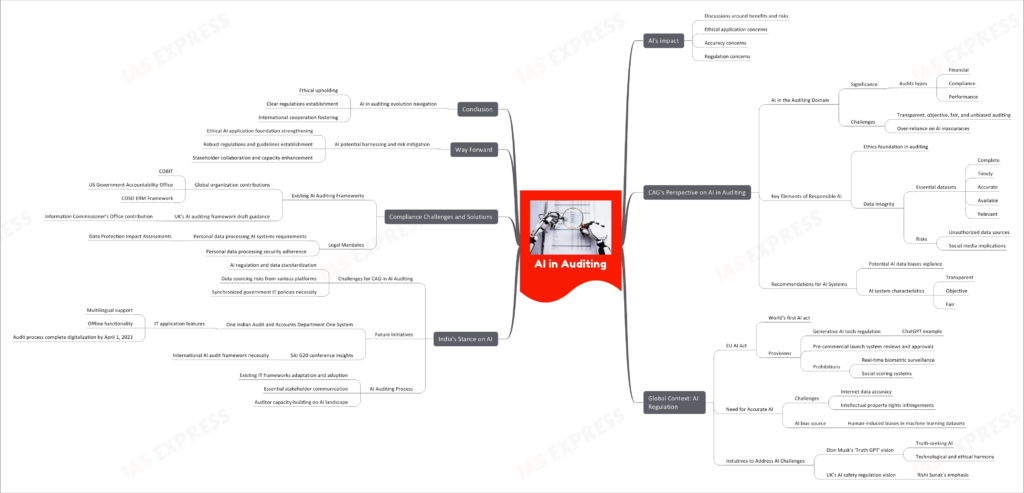AI in Auditing- How can the Sector Benefit from it?
From Current Affairs Notes for UPSC » Editorials & In-depths » This topic
IAS EXPRESS Vs UPSC Prelims 2024: 85+ questions reflected
The use of Artificial Intelligence (AI) in auditing has sparked discussions around its potential benefits and risks. As AI continues to gain traction in this domain, concerns surrounding its ethical application, accuracy, and regulation come to the forefront.

CAG’s Perspective on AI in Auditing
AI in the Auditing Domain
- Significance: CAG conducts various types of audits, including financial, compliance, and performance audits.
- Challenges:
- Ensuring AI-induced auditing remains transparent, objective, fair, and unbiased.
- Addressing potential inaccuracies due to over-reliance on AI.
Key Elements of Responsible AI
- Ethics: CAG emphasizes the importance of ethics as the foundation of AI in auditing.
- Data Integrity:
- Complete, timely, accurate, available, and relevant datasets are critical.
- Risks related to unauthorized data sources, including social media.
Recommendations for AI Systems
- Auditors must remain vigilant about potential AI data biases.
- AI systems must be transparent, objective, and fair.
Global Context: AI Regulation
EU AI Act
- Introduction: The European Parliament approved the world’s first AI act in June.
- Provisions:
- Generative AI tools, like ChatGPT, undergo stricter regulation and scrutiny.
- Developers need system reviews and approvals pre-commercial launch.
- Prohibitions on real-time biometric surveillance and “social scoring” systems.
Need for Accurate AI
- Challenges include ensuring internet data accuracy and addressing potential intellectual property rights infringements.
- Addressing AI bias originating from human-induced biases in machine learning datasets.
Initiatives to Address AI Challenges
- Elon Musk’s vision of ‘Truth GPT’: A truth-seeking AI aiming to blend technological advances with ethical considerations.
- Rishi Sunak, UK’s Prime Minister, emphasizes making the UK the hub for AI safety regulation.
India’s Stance on AI
Challenges for CAG in AI Auditing
- Issues related to AI regulation and data standardization.
- Risks due to data sourcing from multiple platforms.
- The need for synchronized government IT policies.
Future Initiatives
- “One Indian Audit and Accounts Department One System” – An IT application supporting multilingual content, offline functionality, and complete digitalization of the audit process by April 1, 2023.
- The SAI G20 conference highlighted the necessity for an international AI audit framework.
AI Auditing Process
- Adapting and adopting existing IT frameworks and regulations.
- Close communication with all stakeholders is crucial.
- Capacity-building initiatives for auditors on the AI landscape.
Compliance Challenges and Solutions
Existing AI Auditing Frameworks
- Various global organizations, including the COBIT, US Government Accountability Office, and the COSO ERM Framework, have developed AI auditing frameworks.
- The UK’s Information Commissioner’s Office released draft guidelines on the AI auditing framework.
Legal Mandates
- AI systems processing personal data require Data Protection Impact Assessments.
- Auditors must ensure personal data processing adheres to security standards.
Way Forward
To harness AI’s potential in auditing while mitigating its risks, it is imperative to focus on:
- Strengthening the ethical foundation of AI applications.
- Establishing robust regulations and guidelines.
- Building capacities and enhancing collaboration among stakeholders.
Conclusion
As AI integration in auditing continues to evolve, it is essential to navigate its challenges responsibly. By upholding ethics, establishing clear regulations, and fostering international cooperation, the auditing sector can leverage AI effectively and ethically.
Practice Question for Mains
What are the advantages and challenges in integrating AI technology into the auditing sector? What is the way ahead? (250 words)
If you like this post, please share your feedback in the comments section below so that we will upload more posts like this.

